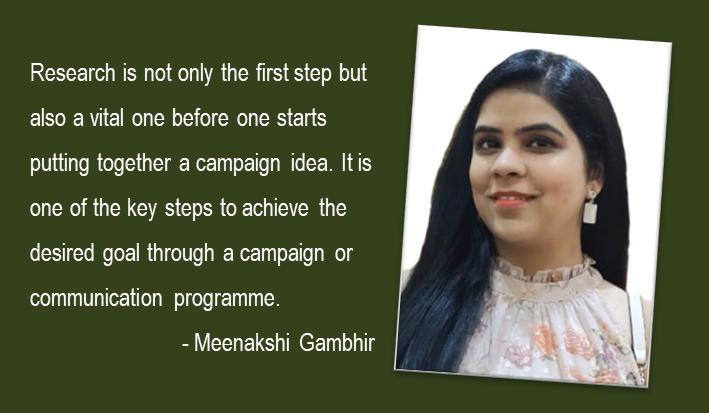“Publicity is absolutely critical. A good PR story is infinitely more effective than a front page ad” – Richard Branson
As indicated by experts and veterans, Public Relations is an imperative tool in the marketing mix for any brand, company or individual. If planned effectively, a well thought – out PR strategy and campaign can be the most powerful way to build a connect with your audience and create the right kind of visibility.
PR as a business has evolved immensely over the last few years and is expected to grow further. These developments have led to the rise of campaign – driven communication which helps in creating a top-of-the mind recall value for the brand and leave a mark amongst the end – customer. However, a campaign is not only an idea and its execution, a lot more goes behind the designing of a successful PR campaign
Some key aspects to keep in mind while curating a PR driven campaign are:
- Thorough Research
Research is not only the first step but also a vital one before one starts putting together a campaign idea. It is one of the key steps to achieve the desired goal through a campaign or communication programme. Knowing the industry trends, what your competitors are offering, knowing your customer well are some of the key aspects of the research conducted. Another important component while conducting research is to keep an eye if any other campaigns by direct/ indirect competitors are being hosted/ run at a similar timeline and if they will diminish the effect of your campaign.
- Define Objectives and Goals
Knowing the outcome of your campaign is of utmost importance while working on a campaign idea. It will help assess and re-look at the strategy at every step as one progresses further. These objectives and goals should be SMART – Specific, Measurable, Achievable, Realistic and Time Based – in order to meet the targets you have set for yourself.
- Unique Selling Proposition
To attract the eye-balls of the consumer, list down USPs of the product/ service the brand offers. Every campaign is designed to solve a problem, identifying the problem correctly and analysing the kind of impact you hope to achieve by applying the desired strategy, will bring you one step closer to nailing your USP. Anything which is not unique might not stand out in the cluster of brands and the relevance of the campaign might get lost. So while one is designing the campaign, they should make sure that the communication revolves around the key selling points
- Specify Key Messaging
One should be specific about the message they want to convey through their PR campaign. The key messaging should be fabricated keeping in mind what the audience would like to hear/ read. The messaging should be relatable, concise, crisp and clear. The choice of words while curating the key messages should be extremely thought through to avoid any confusion. Vague messages or negative choice of words might mislead the consumer and can leave a negative impact on them. Avoid the usage of jargons or sugar coated words as it can exasperate the listener/ reader
- Know the Target Audience
Knowing the audience is not limited to – being well aware of their preferences but also their geographical location, age groups, social status, lifestyle and spending capacity along with behavioural patterns and preferences. One can only define the key messaging and set the desired goals if they have a clear understanding of these aspects
- Set the Timelines
One should time themselves for every task on the way and set deadlines to be able to work effectively to make their campaign a success. Once the deadline is being set, start working backwards. Always have some extra days/ leeway hours while setting up the deadlines. Do not wait till the last hour to close any activities/ tasks, no matter how simple they might be. Deadlines will also help in measuring the success of the campaign at every step. The campaign timelines should also be in sync with the other plans/ strategies of the campaign
- Create Strategies and POA
Break down each and every aspect of the campaign and create a plan of action. Work on detailed checklists to make sure nothing gets missed including things like target media list, talking points for press releases or interviews, media kits, third party vendors et cetera. Have a bifurcation of tasks to be undertaken by each individual from the team to avoid any confusion or last minute misses.
- Creative Story Angles
Brainstorm with your team and curate creative story angles – which could be of interest to the media. Do not pitch similar stories/ topics to all media houses. The pitches should be tailor made and customised as per the publication’s interest, its editorial policies and interest of their readers. Pitching the stories creatively and exclusive to the media house will always garner interest from the media. The story pitch should address the five Ws and the H of the story.
- Go Beyond the Regular Routes
The world is more digital today than it was a few years ago. It is imperative that you factor in the power of technology and the post-marketing plan of the campaign you design. A 360-degree outreach is vital for your campaign’s success. Not only should you leverage tools that are a part of your budgets, such as influencer outreach, collaborations, and more, but it is essential that you intuitively analyze who would benefit from the said campaign. This will allow you to engage newer routes personally, including promotions on social media, WhatsApp groups, and more can aid in driving the value of the campaign to greater heights. So, the idea is to paint outside the lines of traditional practices. If you go the extra mile, the results will most likely be bigger and better than you imagine.
The views and opinions published here belong to the author and do not necessarily reflect the views and opinions of the publisher.



Be the first to comment on "What does it take to design a successful PR campaign"